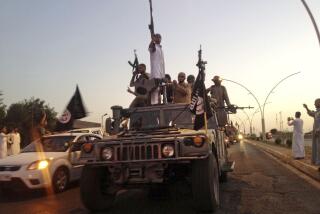Abdul Aziz Hakim dies at 59; powerful Iraqi political leader
- Share via
Reporting from Baghdad — Abdul Aziz Hakim, one of Iraq’s most powerful political leaders and the head of one of its most prominent Shiite religious dynasties, died today in a Tehran hospital, his party’s television channel reported.
Hakim, who headed the influential Supreme Islamic Iraqi Council, died of complications from lung cancer, which he was diagnosed with in 2007, Al-Furat television station said. He was 59.
Hakim was a towering figure in the post-U.S.-invasion political landscape. He led a coalition of Shiite parties to victory in Iraq’s 2005 elections while juggling his close friendships with both Washington and Tehran.
As a prominent member of the U.S.-appointed Governing Council, set up to advise U.S. administrator Paul Bremer in the months after the invasion, he became a close American ally who spoke regularly with former President Bush by telephone and was received at the White House in 2006.
But his chief benefactor was Iran, where the Supreme Council was founded in the 1980s to oppose the regime of Saddam Hussein and where Hakim spent more than two decades living in exile.
A theologian who always wore the black turban and flowing robes of a senior Shiite cleric, he was seen as a divisive figure by many Sunnis. Many associated him with the killings of Sunnis by the Supreme Council’s military wing, the Badr Organization, in the aftermath of the fall of Hussein and with the ascendant influence of Iran in Iraqi politics.
He assumed the leadership of SIIC after his brother Mohammed Baqir Hakim was assassinated in a car bombing in Najaf in 2003. His six other brothers were killed by Hussein’s regime, and Hakim himself was imprisoned three times before he fled to Iran in 1980.
In a statement read on his television station Al-Furat, his son Ammar hailed his life of “jihad and struggle against injustice.”
“He surrendered his soul to the one who he worshipped as his forefathers and his martyred brothers did,” the statement said.
Prime Minister Nouri Maliki, who recently has broken ranks with the Shiite alliance, issued a statement of condolences, describing Hakim as “a brother and a pillar of strength during the battle against the former regime.”
He was, said Maliki, “a foundation stone in the building of the new Iraq, and his death at this sensitive time is considered a great loss for Iraq.”
His death coincides with a period of frenetic political negotiations ahead of national elections due in January and came just two days after prominent Shiite leaders launched a revamped version of the Shiite coalition he headed at the last election
Notably absent was Maliki, who appeared set to run separately from his former allies at the head of his own coalition, potentially dividing the Shiite vote.
Hakim’s death could embroil one of the alliance’s leading factions in a bruising leadership struggle just as it is gearing up to contest the elections. Ammar Hakim is the most likely successor, but he’s seen as lacking the stature of his father, and there may be other contenders.
More to Read
Sign up for Essential California
The most important California stories and recommendations in your inbox every morning.
You may occasionally receive promotional content from the Los Angeles Times.










